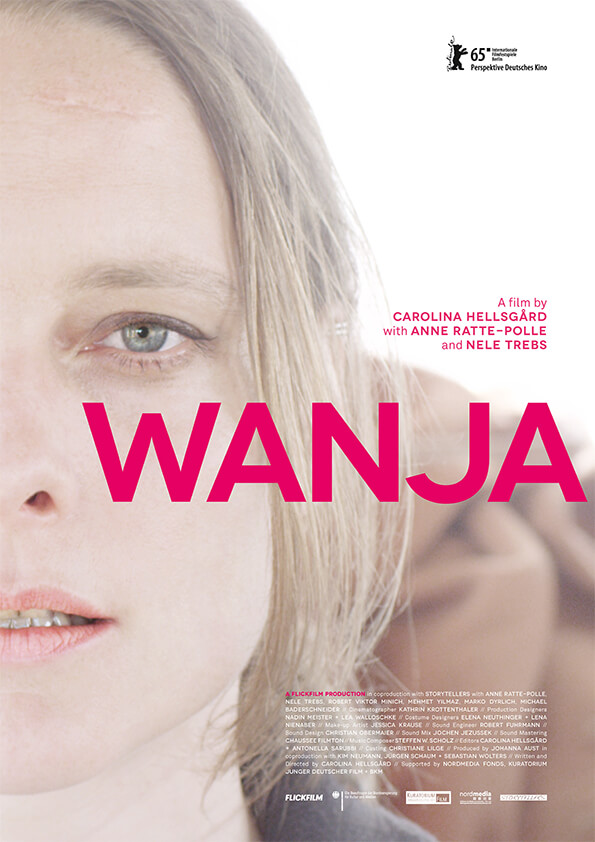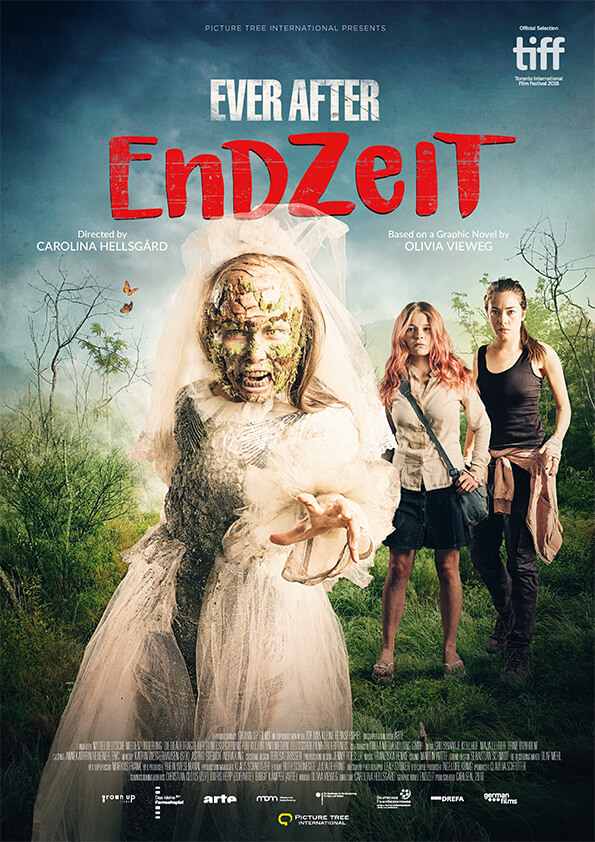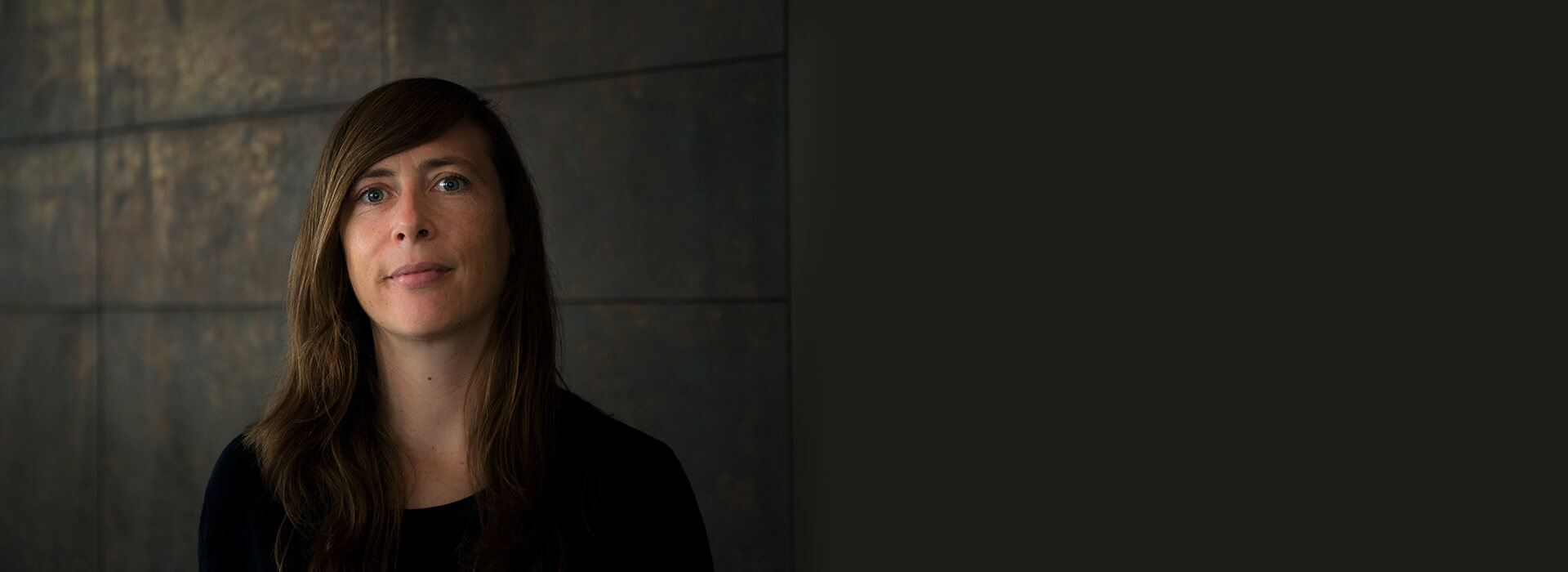A PORTRAIT OF DIRECTOR CAROLINA HELLSGÅRD
Carolina Hellsgård (© Carolina Hellsgård)No, not the lady herself, although she could be handy in a fight, but rather Carolina Hellsgård’s one liner to her latest film, the apocalyptic zombie horror and female relationship drama that is ENDZEIT – EVER AFTER, which has just taken the Toronto International Film Festival 2018 by storm. It garnered any number of plaudits, such as The Hollywood Reporter’s Stephen Dalton calling it “An enjoyably grim fairy tale that injects fresh life into the undead genre... a smart and stylish treat, with two engaging leads and plenty of fresh ideas” and is now, according to sales agency Picture Tree International, selling like hot cakes.
Carolina Hellsgård hails from Sweden and moved to Germany in 2001 to study Experimental Media Design at the Berlin University of Arts, where she worked with Hartmut Bitomsky, Thomas Arslan and others, “and making several shorts, sometimes with people from the DFFB.” On graduating in 2008 she won a grant and a year at CalArts to study film Directing and Screenwriting. Returning to Berlin she made her first feature, WANJA, “about a female bank robber who leaves prison to go straight. It showed at the 2015 Berlinale and went on to other festivals, getting a release in 2016.” It was nominated for the Berlinale Best First Feature Award 2015, won the Best Feature Film Debut at the Biberacher Filmfestspiele and also the Best Screenplay at Valetta IFF in 2015.
Prior to Berlin, Hellsgård gained an MA in Film Theory and History at Stockholm University, that giving her an exchange to the Berlin University of Arts “where I stayed. The theoretical background to a film is very important for me, I’m formal in my approach. I look for a cinematic form which ties into the state of being that the characters are presently in: the person in the film influences the cinematic image since it reflects the characters’ inner state.” Right. So how does that work with zombies? Incredibly well, as we now know.


A plague has swept the world. Weimar and Jena, the only surviving cities, have very different approaches to the epidemic. In Weimar, Vivi (Gro Swantje Kohlhof), vulnerable and numb as a result of apocalypse-triggered tragedies, reluctantly volunteers at the city’s perimeter. It is at the ramshackle outer fences, requiring constant defence from attacks by infectious cannibal revenants, that she meets Eva (Maja Lehrer), whose icy stoicism makes a striking contrast to Vivi’s delicate fragility. Following an attack at their post, they board an automated supply train bound for Jena, whose more humane approach to the victims of the epidemic offers some hope for the future. When the train unexpectedly breaks down, Vivi and Eva are left to fend for themselves in a countryside teeming with dangers and marvels they never dreamed of.
“When I read Olivia Vieweg’s screenplay, I was fascinated by the topic of guilt,” Hellsgård explains. “As a person, you often feel guilty about certain things. It’s about all the bad stuff we did and all the good things we did not do. A horror movie is a great tool to confront the characters with their own lives, and question their own morals, as well as challenge their inner demons. How does one exist as a human being in this world? How do I treat other people? And when I face chaos and difficulties, how do I react?”
At the time of this interview Hellsgård was unsure if she was even allowed to mention TIFF taking the film for the Discovery sidebar, “We were not even finished, it was still in the rough cut”, and the official announcement yet to be made. But she was certainly unstinting in praising her key and female team: DoP Leah Striker “a fantastic and very experienced camerawoman. I had been an admirer of the set designer Jenny Rösler’s work for a long time. The costume designer Teresa Grosser has her own style and provided a very strong costume concept, which I loved.” The composer Franziska Henke and producers Ingelore König and Claudia Schröter are also female, and, of course, the two leads, Gro Swantje Kohlhof and Maja Lehrer. But a read of the end crawl shows the production was actually 50-50 male and female, Hellsgård believing that to be the best ratio.
She certainly knows her way around genre as well, perhaps growing up with all those Swedish trolls! “I grew up with Nordic fairy tales with trolls in the forest and moral questions about right and wrong,” Hellsgård expands on the theme. “Zombies are like trolls. They embody existential anxieties. Here they also embody how we treat the environment and how we relate to nature.” Bringing all the elements together, and her love of anti-heroes, of people who are outsiders in society, marginalized, how they live and deal with problems, daily struggles, their dreams and emotions,” and a post-apocalyptic zombie film, “arthouse horror” as she calls it, is the perfect vehicle. She cites 28 DAYS and THE GIRL WITH ALL THE GIFTS (“One of the best endings ever”) as two of her favorites, along with RAW and GET OUT.
Hellsgård, who used to be a film critic before there was an Internet and took herself off to Cannes, is now working on her third feature film, SUNBURNED, in which 12-year-old Claire is holidaying with her family in Spain. While being neglected by her mother and sister, she meets a Senegalese immigrant called Amram on the beach. As a part of a childish game she makes him a promise she can’t break.
“It’s my own script,” Hellsgård continues, “based on my childhood memories, the eternal power struggle between my sister and I, and how we alternated between being friends and in conflict with each other. I remember how the holidays allowed us to take on new personas, and how our teenage-selves evolved as we encountered new people,” she continues. “It was an intoxicating feeling, closely related to the promise of leaving our childhood behind. Our road to adulthood often took place against the backdrop of poverty and political unrest in the countries we visited. But like most tourists we indulged in the food, people and culture, instead of reflecting upon the circumstances. SUNBURNED is about all this; tourism, immigration and ultimately the dream about Europe. The film centers around the story of two young people and their shared longing for a better existence.”
Every film she makes, Hellsgård explains, “is a reaction to the one before.” So where WANJA is “strict and minimalistic,” ENDZEIT is “maximalistic!”. “SUNBURNED, will have a different pace.” And for the one after that, “I want it to be a thriller. I absolutely love a good plot. It gives me lots of freedom to make it more atmospheric. I plan to make a very plot driven and hard boiled thriller, a Berlin Noir. I like it where you can’t trust the main character. Evil or good is too easy.”
Apart from her love of film, Hellsgård has a special place in her heart for Berlin as well: “I feel privileged to be here,” she enthuses. “There are lots of very talented people around and Berlin is a great city! I graduated ten years ago and have been working extremely hard, collaborating with new people, it’s a very dynamic place to be. You need a certain amount of luck as a director, you need good people and I found them here.”
Ticking off names that inspire her, Hellsgård mentions Lynne Ramsay, Claire Denis, Valeska Grisebach, Andrea Arnold, as well as her admiration of actors such as Michael Fassbender, Léa Seydoux and Joaquin Phoenix. And for the obligatory “What do you do when you are not doing this?” question, she says she reads, “A lot! A lot!” and after a thought, “I also play badminton!”
This just in: ENDZEIT – EVER AFTER has just been sold to yet another territory. Market premieres are scheduled for Rome’s MIA market, AFM has now been confirmed and there are numerous festival enquiries rolling in. Not at all bad for a second feature.
As Yuan Rothbauer, co-managing director of Picture Tree International says: “Carolina Hellsgård is without a doubt one of the most interesting and versatile young filmmakers working in German cinema today.”
Simon Kingsley

